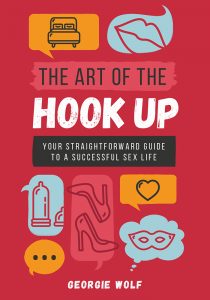I hit on a guy at a party once.
It was a Saturday night. Picture a room full of strangers… and me in the corner. I had a gin and tonic clenched, white-knuckled, in my hand. The object of my affection was a few metres away.
He was having a good time, laughing with his friends. I’d been crab-walking around him for an hour, in that awkward way I do when I’m interested but haven’t found the right way to approach. Gradually my orbit tightened, and I somehow managed to end up standing shoulder-to-shoulder with him on the side of the dance floor. We already knew each other, but he didn’t know I had a crush on him. He was about to find out, in the most direct fashion. I took a sip of my drink, then blurted, ”Hey, nice to see you again! Uh, I just wanted to say, I think you’re really fucking awesome and if you want to make out some time, I’m totally down for that.”
”Gee, thanks.” he said.
They say ninety percent of communication happens via body language.
Eyes unfocused, turning awkwardly away, tense shoulders – every part of his body was saying ‘hell, no.’ There was dissolving feeling in the pit of my stomach, as though I’d just chugged a glass of battery acid. I looked down at my feet and he must have taken the opportunity to escape, because when I next glanced up he was on the other side of the room, kissing my best friend. I stood there by myself, feeling like I was dying, and watched the two of them sucking face for what seemed like hours.
When you’re hooking up, rejection is an inevitability. Like pieces of a jigsaw puzzle, we’re not all designed to fit perfectly together. It can happen when we’re unmatched on Tinder, or when we try to strike up a conversation with a stranger. It can happen after an epic one-night stand, when we get turned down for a second date. It can happen when we’re seeing someone on the regular, but they decide they’re no longer interested.
Rejection has the power to make us feel as though the world itself is crumbling.
How do we survive the rejectionocalypse?
How do we get back on our feet, thrive on the experience, and become better at hooking up? Here are my thoughts.
If you’re a straight bloke, you might be thinking, ”What the fuck would she know about being rejected? Chicks get rejected much less than guys do.” Tinder can be a grind for hetero guys – I have friends who spend hours swiping for just one match. But saying ‘guys get rejected more than girls’ is a huge oversimplification. For starters, I put myself out there more than many – I chat people up and make offers on a regular basis, even if it’s just for the practice. Since hooking up and rejection go hand-in-hand, I hear ‘no’ a more often than someone who stays home and binge-watches Netflix.
And it’s not just about gender. Some people struggle to find sexual partners more than others – those who don’t fit society’s mainstream standards of beauty, for example. People from racial minorities. People who are shy or socially awkward. People who struggle with disability or mental health issues. I’ve been knocked back because I’m a sex worker, and because I’m non-monogamous. Being ‘different’ can complicate things. I’d encourage you not to make assumptions about who’s being rejected the most. Instead, let’s talk about learning to handle an experience that’s universal, regardless of who you are or how you hook up.
Rejection: You Are Your Own Worst Enemy
I think the unpleasantness of rejection is less about how often it happens, more about how we interpret our experience.
Hearing a ‘no’ can feel crushing. Rejection is like a heat-seeking missile – no matter where it’s aimed, it inevitably hits us right in all our vulnerable places. That means that, although the person who has turned you down might have perfectly legitimate reasons for doing so, we tend to blame it on ourselves – and in particular, all the things we don’t like about ourselves.
I have a female friend who loves hooking up, but struggles with insecurity. She’s a femme fatale with an hourglass figure and perfect hair. She’s one of those women who blinds you with both good looks and intelligence. But because mainstream media tells us that being curvy isn’t considered attractive, she’s always worrying that her partners think she’s ‘too big.’ Whenever she goes out with someone but doesn’t get to a second date, she assumes it’s because she’s fat even though none of them have said or done anything to suggest this is the case.
My friend’s body insecurity is her ‘ground zero’. When she is rejected, she worries that her weight is the problem, when in reality it could be any of a million other things, many of which have nothing at all to do with her appearance. For her partners, it’s just another snap decision they make about a Tinder date….for her, it’s a bomb dropped on her self-esteem.
Whether your rejection is kind or brutal, it doesn’t change the fact that everyone has a right to say no. We’re never going to know exactly why the other person has turned us down. So do you really want to make yourself miserable by dwelling on your insecurities? Shouldn’t we admit that sometimes it just doesn’t work out?
When it comes to rejection, your enemy isn’t the person standing in front of you – in fact, their honesty is helpful. Rejection allows you to move on so that you don’t waste time and effort. No, your worst enemy is that little voice in your head that says ‘you’re such a loser’, or ‘you should have known not to ask.’ Once you let those ideas take over, the rejectionocalypse is on the way.
The Four Horsemen
We’ve all taken rejection badly at one time or another. But how do you know you’re on the way to a complete meltdown? Here are four warning signs – let’s call them the ‘Four Horsemen of the Rejectionocalypse.’ Ignore them at your peril, because they are the ultimate harbingers of destruction.
1. Insecurity – having all those fears about your own worth claw their way to the surface of your thoughts. It’s an uncomfortable experience – basically, your brain is torturing itself. Fun!
2. Shame – thinking ”I’m a terrible person for asking” or ”I’m a terrible person that nobody wants.” Getting stuck in a shame hole might ruin your day…or your life, if you let it.
3. Blame – getting mad at the person who has said no, as though they’re responsible for the way you feel (hint: they’re not, and acting like it’s all their fault is a HUGE asshole move.)
4. Fear – ”What if this happens again? Maybe I should just give up.” When rejection is too hard to handle, we go out of our way to avoid being vulnerable to it in the future. That means missing out on all sorts of fun opportunities.
Each of these reactions will fuck with your head and get in the way of your health and happiness. The problem is, these feelings are really common. We learn from a young age that being told ‘no’ means we’ve done something wrong. Accordingly, most adults will do anything to avoid hearing a ‘no’, trying to dodge these feelings of shame and inadequacy. Add a big dose of sex-negativity into this mix, and you’ve got something that’s almost guaranteed to blow up, if not handled carefully.
Thinking that ‘no’ equals ‘bad’ is really unhelpful. We’re not mind readers – to know what other people want and need, we must hear both ‘yes’ and ‘no.’ Nowhere is this more important than in the pursuit of sex and relationships. Dating is complicated – it’s impossible to work out exactly what your partner wants and how they’re feeling, unless you ask. And the consequences of not asking can be disastrous – apart from hurting someone’s feelings, you could also violate their rights. It’s essential to ask, even knowing that the answer might hurt.
On the other hand, not being afraid to ask can lead you on all sorts of interesting adventures. To be good at sex and dating, you need to be able to cope with rejection. That means avoiding Armageddon, and finding a better way.
Okay, smartass, what’s the better way?
How the fuck do we stop feeling so bad about being rejected?
Glad you asked. Being a sexual superstar is 10% sex skills, 20% confidence and 80% mental bulletproofing. One of the best ways to become strong is to build up your rejection resilience. Rejection resilience is the skill that allows you to bounce back from setbacks (such as my disastrous party pick-up at the beginning of this story). It’s the ability to confront the feelings that rejection provokes, yet still recover and try again.
A lot of people think that this means shrugging off your feelings as though they don’t exist. ”Just suck it up, mate.” is a common retort when guys talk about being rejected; that phrase really pisses me off. Because the truth is, rejection is painful – for all the reasons we talked about earlier. If you try to pretend those feelings aren’t there, they’re going to come back and bite you. Feelings are slippery little things. When you try and hide them away they cause all sorts of mischief – they make you depressed or burst out at inappropriate times. Don’t ”suck it up.” Own up to it. The best way to handle a slippery feeling like shame or insecurity is to get it right out in the open and admit that it hurts.
Strategies for rejection survival:
Let your feelings exist. Pay attention to how your body feels, in the moment. Concentrate on how your feet feel touching the ground, or on the feeling of air going in and out of your lungs. Focusing on the physical sensations of emotion in your body helps your brain process them: after a while, they fade away. The same process works for unpleasant thoughts. I tune into the negative thoughts that are coming up and let them bounce around in my head, not taking them too seriously.
‘Reality-check’ the negativity – if your brain is screaming at you, ask yourself whether your insecure thoughts are realistic. If you feel as though you’ll never get laid again, remember the times it’s happened in the past. If you’re beating yourself up for getting things wrong, remind yourself that everybody makes mistakes. Our worst fears and insecurities aren’t rational, so a dose of I-call-bullshit can be helpful.
Be kind to yourself. If this were happening to your best friend, what would you say to them? Are you being harder on yourself than you’d be on someone else who was just rejected? Sometimes we have to be our own best friends, cut ourselves some slack, and listen to the advice that we’d normally reserve for others.
Get help if you need it – sometimes feelings of shame or self-doubt are overhwelming, and we can’t go it alone. If you struggle with depression or anxiety, you might not be able to wait out the bad stuff by yourself. If so, find someone to support you. A counsellor or psychologist can be useful for working through the bad stuff, and so can a good friend. Crisis hotline Lifeline (13 11 14 in Australia) is great if you need emergency support.
After my awkward party rejection, I stood and watched my crush making out with my best friend. I felt pretty bad. I probably could have gone into the kitchen and smashed another few G&Ts, then cracked onto some other random guy that I wasn’t interested in, to make myself feel better. Those tactics would have distracted me from my feelings (well, at least until the hangover the next day.)
Instead, I stood still for a few minutes. I breathed in and out, noticing how much my chest hurt. I noticed the thoughts that were coming into my head: the \”am I completely unattractive?” and ”was it inappropriate for me to even say that?” I thought about the times I’d rejected other people. I thought about the times I’d been successful – surely I couldn’t be that bad, if some people did want to hook up with me?
And then I gave myself a little pep talk. ”Hey, it was brave of you to try,” I told myself, ”But he wasn’t interested, and that’s cool – he’s probably just more into other sorts of people. Now you know, and you can get on with finding someone better for you.” I can’t say my heart was entirely convinced. But it was enough to get through the moment. Once I’d survived those first few minutes, everything started to feel easier. And once I’d found another friend to talk to, I was almost back to normal.
When it comes to hook-ups, rejection is part of the deal; you WILL hear ‘no’ from time to time. But it doesn’t have to be the end of the world – every rejection is an opportunity to become stronger. Rejection resilience is a worthy skill to learn – the more practised you become at avoiding the rejectionocalypse, the quicker you’re able to move on and have better experiences.



